This page is being continually updated. Please be patient with mobile UX and places still needing additional content as we continue to improve this resource.
-Richard Lockwood: Content Director
Digital Marketing For Medical Offices & Wellness Centers
SEO & Content Strategy for Naturopathic, Chiropractic & Acupuncture:

- Why am I Teaching This?
- Who Controls the Digital Narrative?
- Be part the Healthcare Conversation
- What is SEO?
- A Brief History of SEO
- SEO Basics
- Blackhat vs Whitehat SEO
- Why WordPress, What About “____”?
- Create Compelling Content
- Local Search: Put Your Biz on the Map
- SEO Tools & Metrics
- Image Optimization
- Student Q & A
Table of Contents:
This series accompanies a business development course that I helped create. I’m making this information public because I want to help change the healthcare narrative on the national level. Your perceived skill is directly proportional to the high-quality content you give away. Everywhere in this country there are small doctor’s offices and wellness centers who need help with digital marketing and the naturopathic space is behind on these fronts. By using digital marketing to publish useful and informative articles about healthcare topics, you establish yourself as the expert. Want to give yourself a competitive advantage as a new business, entrepreneur or independent contractor? Learning digital marketing, basic graphic design and content creation will make it so you can produce professional-grade advertising for free at home.
Increasing the digital footprint of natural healthcare is important for a number of reasons. Naturopathic doctors, Chiropractors, Acupuncturists and others within the integrative healthcare space can greatly benefit from a positive, meaningful digital presence.
When people think of digital marketing, it’s obvious to think of commercial success, enterprise level solutions and perhaps the irksome ads that seem to pop up like weeds on your favorite content. However, there are more important factors than money at work here. Ironically, paying attention to these non-monetary aspects of naturopathic medicine’s role in the digital space will lead to increased commercial/financial success. With the strategies that I will outline in this series, we can change the narrative of healthcare.
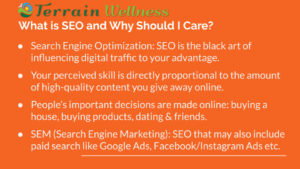
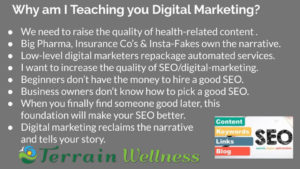
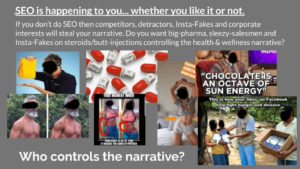
My Reasons For Creating This Resource:
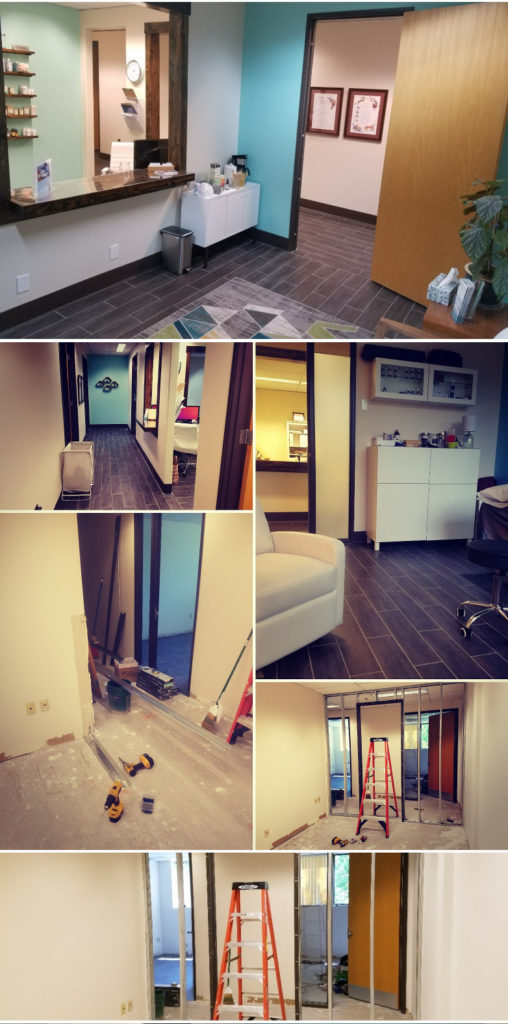
- Why Teach SEO for functional medicine?
- We need to raise the quality of health, wellness & fitness content.
- Big Pharma, Insurance Co’s & Insta-Fakes should no longer own the narrative.
- Low-level digital marketers repackage automated services or offer little value.
- I want to increase the quality of SEO/digital-marketing in the alternative medicine space.
- Beginners, students and independent contractors in the space often don’t have the money to hire/buy good SEO.
- Even those business owners who do have the funds find it hard to pick a good SEO.
- Even when you do finally find a good SEO firm, this
foundation will make your SEO better. - Digital marketing reclaims the narrative
and tells your story.
The best thing we can all do for functional medicine doctor’s offices and the naturopathic, acupuncture and chiropractic fields can do is raise the standard of healthcare content that is available to consumers. In time, quality wins. Through producing high-quality, highly visible content that helps the public by answering questions, dispelling myths and just being generally worthwhile, we can increase our respect and relevance within the healthcare community.
What if you decided to make the best Anatomy & Physiology Study Guide ever and release it on your website free of charge? 1: you’d get a bunch of inbound links that would help your SEO. 2: you’d start adding value for future RN’s, MD’s, Dentists and scientific researchers. Why help those students? Because those students are tomorrow’s policy-makers, hospital administrators and healthcare workers. The result of properly done content-strategy isn’t just about SEO, it’s also a “hearts & minds” campaign that will help change the narrative and improve healthcare.
By making this series publicly available, I’m practicing what I preach because I know that as this SEO-Guide helps more people in the naturopathic, chiropractic and acupuncture fields, my website will benefit. I am not holding back any advice that I have and am giving all of my readers my best. However, there’s no way for me to beam 10 years of digital marketing experience into your heads any more than your articles could make me into a naturopathic doctor or chiropractor.
Naturopaths, Chiropractors & Acupuncturists must join the conversation
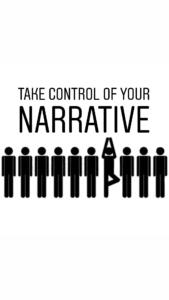
This is probably the most important point of all. Integrative healthcare needs to use SEO to reclaim its own narrative. While most people are well-meaning, many powerful institutions just don’t understand naturopathic medicine, acupuncture and chiropractic in the way that we do. Furthermore, corporate interests such as big pharma, insurance companies and Instagram personalities with no accountability pushing health/fitness.
- Who is telling our story?
- Big Pharma is abusing patents, and it’s hurting Americans
- Health Insurance: “We’re Getting Ripped Off”
- InstaFakes: misleading InstaGram tactics used in health, fitness & wellness
Every day, people search online for the answers to serious (and not so serious) questions about healthcare, wellness, fitness, medication and nutrition anatomy/physiology/biochemistry. Right now, integrative healthcare, naturopathic, acupuncture and chiropractic are under-represented in this conversation. By writing high quality, informative content with relevant images that educate and inspire, we can go claim our place in this conversation. Even more, we can help people who need us, even if they are not our customers. By helping people everywhere, we will attract patients to us.
Lastly, your perceived experience is directly proportional to the amount of high-quality, useful online content you produce around subjects that are important to your patients’ needs.
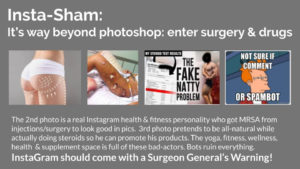
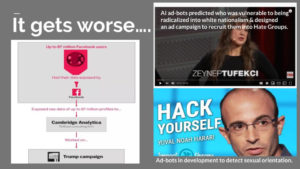
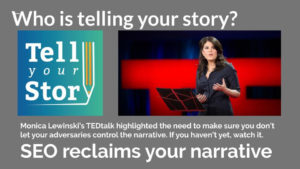
SEO, ethics & the healthcare narrative
The videos below highlight some of the difficulties and ethics concerns of the digital age. Functional medicine MD’s need to join with naturopathic, chiropractors and acupunctuirsts to help reframe the healthcare conversation. Dr. Yuval Noah Harari discusses how artificial intelligence is being developed that can influence people’s decisions, thought patterns and the startling implications of this. Zeynep Tufekci, in her chilling and poignant TEDtalk, explains how unethical advertisers could guide society to a very negative future if we’re not careful. The rapid increase in technology on a variety of fronts raises critical ethics conversations that we need to be a part of. Monumental paradigm shifts in how humans consume information and form their most basic opinions makes our role in the worldwide healthcare narrative even more relevant.
Lastly, perhaps no one on earth could speak more personally and compellingly about the need to own your own narrative than Monica Lewinski. In her incredibly vulnerable and inspiring TEDtalk, she mentions the importance of standing up for your own narrative in this age of internet news. This is more than digital marketing, we are claiming our rightful place in the healthcare and wellness conversation. Monica’s bravery in coming forward with this important message cannot be ignored: be part of the conversation, control your narrative!
SEO 101: Naturopathic, Acupuncture & Chiropractic
- What is SEO?
- It’s an acronym that stands for Search Engine Optimization; I define SEO as the black art of influencing digital traffic to your advantage. Here, “black” means mysterious and should not be confused with “blackhat” tactics, which are risky shortcuts that can undermine your long-term success.
- Why should I care about SEO?
- People’s important decisions are made online: what house to buy, what products to buy, political beliefs, who to date, what ideas are important to their group’s identity, healthcare decisions. SEO puts your content, ideas and message in front of the world where you can participate in important ethical discussions that are happening, with or without you.
- Isn’t SEO just for big companies?
- No, SEO is important for individual practitioners, small doctor’s offices and even for people who just want to work at someone else’s medical practice. Even if you never want to own a business, SEO on your personal brand can help you get a job, bring clients to your job, be a platform for publishing books and other media all while adding your valuable voice to the healthcare narrative.
- I’m just one person, what can I do?
- Even on your own, you can create compelling content that becomes nationally relevant i the healthcare conversation. You do this by helping people who are looking for your knowledge. Providing useful, relevant content that helps answer people’s questions develops your personal brand and drives quality traffic to your website.
- Most Importantly:
- SEO is important to everyone from functional medicine MDs, the naturopathic, chiropractic and acupuncture communities because it gives us a “seat at the table” for our nation’s healthcare conversation. If you don’t have a content-marketing strategy, then you are letting CNN, WebMD, the AMA and even random internet trolls tell your story. It’s time to join the healthcare narrative.
A brief history of SEO:
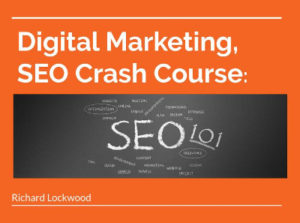
Let’s start with a brief history of how SEO came to be. This history is important to know because many search engine neophytes will think they’ve struck gold when they come up with a brilliant idea that got played out decades ago. Early search engines were simply computers running on a program that went looking for websites like a detective. These computerized detectives are called “spiders” because they metaphorically crawl through the “web” aka internet. Search spiders organize metadata about the websites they find into categories, lists and rankings. Early ranking systems were very crude and would be based on how many times a word was listed and how many links a website had leading to it.
The logic was simple: sites that mentioned a word more often and have more subject-based links referencing them must be the best, so those sites moved to the top of the search results. Developers quickly realized this to manipulate results and began stuffing useless, harmful or misleading websites full of keywords. Search engine designers redesigned their spiders to filter out this spammy content, and so began an arms race that continues to this day. Especially in the early days, “whitehat” developers using honest and ethical website design found themselves in a losing battle against “Blackhat” developers using spam, junk links and more.
Today, Whitehat SEO is the clear winner, but sometimes the difference between Whitehat and Blackhat can be matters of degree or even just conjecture. Sometimes, a strategy that used to be ubiquitous in the search industry will get manipulated and go from Whitehat to Blackhat. As such, most SEO’s have used techniques in the past that they’ve had to abandon and repent of by curating/trimming out bad content and disavowing bad links.
The current SEO world is a great place for people who want to make quality content that helps others. In contrast, current search technology punishes Blackhat tactics that leave people frustrated and dissatisfied. One side effect of this evolution of search engine spiders is that commercial services have a disadvantage in SEO, while more altruistic content has the advantage. However, in the social media space, some Blackhat techniques are still alive and well, so be careful.
So, what do you do if you do have a commercial interest and need to promote your business? In short, provide lots of useful, helpful information that is related to your industry while letting people know about your business in a low-pressure, non-intrusive way.
SEO Basics:
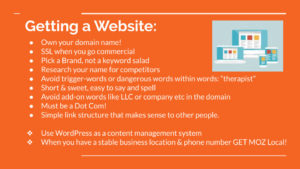
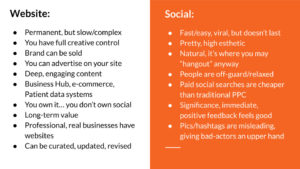
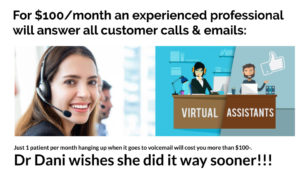
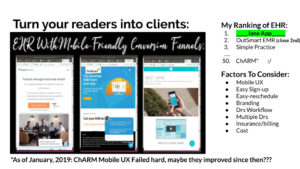
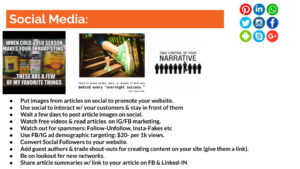
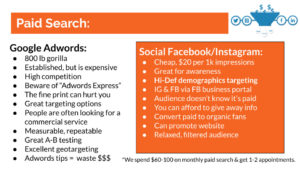
- Getting a website
- Own your domain name! Use WordPress
- SSL when you go commercial
- Domain name, pick a Brand, not a keyword salad
- Research your domain name for competitors, be different
- Avoid trigger-words or dangerous words within words
- Domain name should be short & sweet, easy to say and spell
- Avoid add-on words like LLC or company etc in the domain
- Must be a Dot Com!
- Simple link structure that makes sense to other people.
- Use WordPress (saying it again), GoDaddy has training wheels if you need it
- When you have a stable business location & phone number GET MOZ Local!
- SEO Do’s & Don’ts
- Don’t spam people with too many CTA’s “share/like/notice my stuff”
- Don’t spam closely related keywords, Google understands intent now
- Don’t plagiarize content, no copying other websites
- Don’t have nothing but pages/posts promoting you & your selfish interest!
- Don’t: “Universe, give me the Lion’s share of digital traffic/business while I copy/paste and don’t add value or help others” It is spam. Don’t be a spammer.
- Do: add real value, help people that are not customers
- Do: help people by answering useful questions
- Do: educate and help add the naturopathic perspective
- Do: While helping, you CAN (low-key) let people know what you do etc…
- Do: provide non-intrusive commercial links to your biz page on content that helps everyone…. “Thanks for reading. In closing, if you live in Portland & need a naturopathic doctor…”
- Do embed video & infographics
- Do post to blog first, then social
- Do cite credible, mainstream sources
Blackhat Vs. Whitehat SEO:
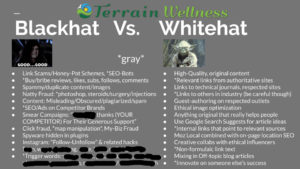
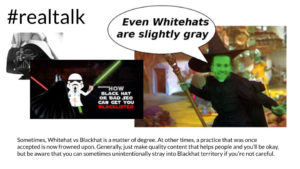
Given the fact that SEO is by its nature trying to improve the position of one’s digital property, there are many times when a harmless tactic is over-used. Sadly, there are other times when certain individuals will stop at nothing to win and engage in harmful, even illegal practices in an effort to improve their search rankings. At any time in the internet age, there have been certain strategies that are accepted as fair and ethical and this is known as “Whitehat SEO”. On the other side of SEO is what is known as “Blackhat SEO”. Blackhat SEO is viewed by Google and Social Media as harmful and those who get caught are penalized by being lowered on search results or even blacklisted/banned.
As with humanity is both altruistic and flawed, most SEO is somewhere in between Whitehat and Blackhat. Often, the difference between Whitehat and Blackhat is a matter of degree. For example, getting links to your site is good but buying links in bulk is not. There are times when you might trade content or pay for a link or two and this is usually okay within reason. For example, signing up for a paid HealthProfs membership could be viewed as technically buying a link, but it’s not link-spamming on an industrial scale. Or, suppose you’re an independent contractor renting a room inside a larger clinic: do you set up a Google My Business account for that address? Maybe, but it may interfere with the clinic you rent from. Technically, in this example you are practicing at that address but since you are renting a space inside of a host wellness center it may be in the gray area.
All this aside, there are definitely strategies that are clearly unethical and will also get you blacklisted from search engines in a hurry. Above is a comparison of some Whitehat vs. Blackhat techniques. Note that the trigger words were redacted, this is because I can’t put my own site at risk by putting in a bunch of questionable keywords together on a page (even in an image). With regard to trigger words, keep in mind that our medical content may brush on anatomy, women’s health, medications/pharmacy, sexuality and other subjects that search engines may restrict access to, which is bad for SEO.
WordPress (Free), Managed WordPress Hosting (Cheap)
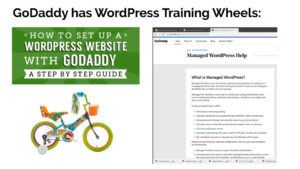
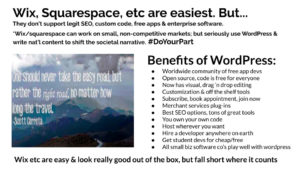
- Benefits of WordPress:
- Worldwide community of free app devs
- Open source, code is free for everyone
- Now has visual, drag ‘n drop editing
- Customization & off the shelf tools
- Subscribe, book appointment, join now
- Merchant services plug-ins
- Best SEO options, tons of great tools
- You own your own code
- Host wherever you want
- Hire a developer anywhere on earth
- Get student devs for cheap/free
- All small biz software co’s play well with wordpress
I’m writing this section because I always get asked about whether another offering is good enough after class. WordPress is the most popular website platform on earth for a reason. It’s just the right answer for almost any website that is not a huge company or using a lot of big-data resources etc. Not only is WordPress free, but there’s also an entire universe of free apps/plugins to help your business succeed. The out-of-the-box website builder companies will get you a decent looking site fast and cheap, but you are at a big disadvantage when it comes to SEO and business technology solutions. Almost every web developer and software solutions company for small business supports WordPress. Lastly, companies like GoDaddy now offer easy setup WordPress that supports drag-and-drop site building so it’s easier than ever: GoDaddy Managed WordPress.
Content Creation: create engaging, useful content

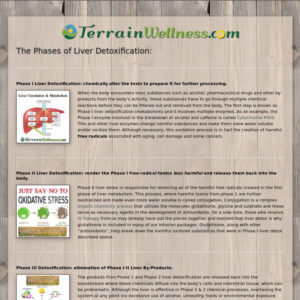
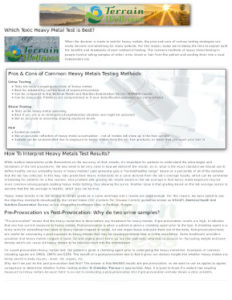
- Tips for content creation:
- Craft engaging titles, subtitles that contain keywords
- 1-3% keyword density in your content
- Make a Youtube Video related to the content & Embed it in the article
- 800 word minimum with 2-5 citations: citations link to the source within the text body, not at the bottom like APA citation
- Create a series of blog articles about different aspects of one issue & link each article back to a relevant page on your site
- Make link text descriptive, NOT formulaic
- Make custom infographics, embed video in your articles
- Optimize Images, 50kb inline, 200kb feature (G.IM.P or…)
- Keywords in Meta desc, Meta tags, subheadings, bolded, lists
- Don’t Keyword stuff, keywords can overlap and overcook your density percents
- Similar keywords considered same by Google
- Some articles should only be slightly related to core content
- Don’t highly optimize every article
These content best practices are general guidelines for producing quality, relevant content that people will actually want to read. First and foremost, content should be original and images should be original as well, if at all possible. We’ve had great results with image-optimized infographics with useful at-a-glance info on them (example: cold and flu treatments). Be sure to read our section on image optimization and follow those practices as well. Sometimes, it’s tempting to push SEO to the limit and at times you’ll get to the first page… with your awkward-sounding article that actual people don’t like. Definitely do mention your city or area and services you offer, but not in unnatural or formulaic ways. Less is more.
If you have a multitude of services, split those services up into different pages and write articles on topics related to each of those aspects. The goal is to provide useful content. Your keyword strategy should be fluid and you should avoid excessive patterns, hacks etc. Don’t just copy and paste a list of cities you serve or services you provide. Rather, work an area or two in here and there. Rather than spending a lot of time doing SEO for a commercial term like “My Product/Service in My City”, make a main commercial page about that commercial service. Next, write articles that are about subjects that are somewhat related to the core content and lightly link back to your commercial page.
For example, Terrain Wellness has a page devoted to thyroid specialists for Portland, Oregon and then we support that page with articles that thyroid patients may find useful. For supporting pages, we’ve written about how estrogen dominance affects the thyroid and about indirectly related topics like liver detoxification that can impact endocrine function of which the thyroid is a part of. The main point here is that useful content that is in the same arena as your services will add relevancy for your commercial services while also helping people everywhere.
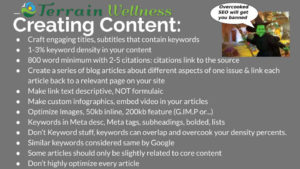
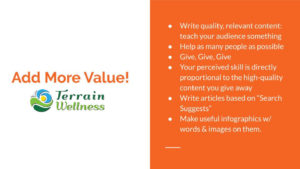

Local Search: How to put your small business on the map (literally)
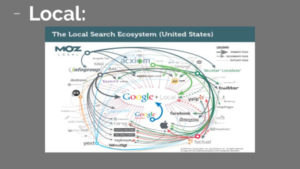
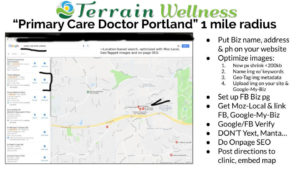
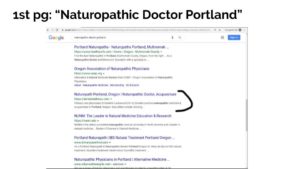
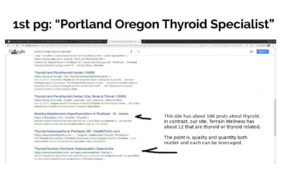
- Put your business name, address & phone clearly on your website.
- Don’t spam Google Maps with fake biz addresses etc: see Duress Verticals scams
- Your address must be exactly the same everywhere, including abbreviations.
- Use all standard Whitehat onpage and content creation techniques: keywords related to services (1-3% keyword density), in-depth content about keywords/services, services & area in headings, meta tags, meta description and images. Supporting articles with useful information that are related to core business that answer the public’s questions/concerns.
- Optimize images: use photos of your actual business and compress the size under 200kb.
Include related keywords in your image names, but don’t stuff them too much. Geo-Tag your image metadata to match your business’ real location. - Upload your location images to your site & onto your Google My Business profile.
- Set up a Facebook Business Page & a Google My Business Account.
- Get Moz-Local and connect your Google My Business and Facebook Business accounts.
- Google, Facebook etc may ask you for credentials or have you go through a verification process. Complete all steps and double-check that they got done right.
- Avoid the multitude of other Local Optimizers. Say NO to “Yext” because even though they are good for big businesses, their policies can be harmful to small businesses.
- Make sure the pages on your website follow sound Whitehat SEO principles.
- write out directions to your office/clinic on the website, embed a google map and help people find you!
Steps for local business optimization:
Moz Local is the best tool you can use for local search optimization. Of course, you need to have decent on-page SEO content that is unique and relevant to your area and services. Mention the city and area that you serve and include your business address and phone number. Of course, you need to set up a Google My Business, Facebook Business and Instagram Business while making sure the address is EXACTLY the same in every place. Exactly also includes inane details like: does your suite number use a “#” sign or do you write out “suite”? Do you spell out “Oregon” or do you abbreviate “OR”? Google My Business and Facebook will have a verification process: it can be annoying but just do it.
WARNING: You may be tempted to set up Google Maps before you have an official business seeing patients at a professional address: don’t do it. Google is cracking down on Google Maps and Google My Business spam big-time. Google’s data-scientists call map spam & map manipulation “Duress Verticals“ because they first noticed map spam from blackhats targeting map searches where customers were desperate for help.
Metrics & Tools: measuring, testing & refining your results
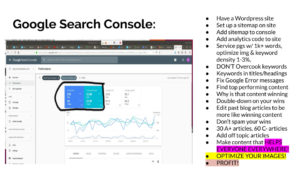
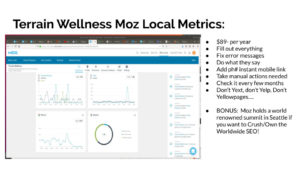
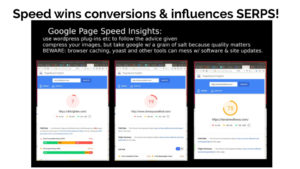
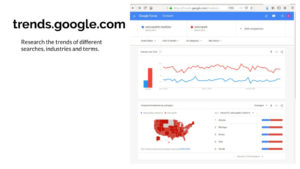
- Do’s & Don’t Related to Tools & Metrics
- Don’t: use a logged-in browser for SERPS
- Okay-ish: use private browser for SERPS
- Best: use Google Search Console, MOZ, Google My Business to measure search metrics
- Use Yoast or All-in-One SEO Pack to manage on-page
- Don’t click on your own links a bunch
- Don’t bounce your own links
- Do measure Google Page Speed, but don’t go too insane on it
- Don’t get overwhelmed with too much data
- Do use metrics to find out what’s working
- Advanced: use A/B Testing w/ PPC to optimize landing pages/ad-text/conversions
- DO: Test your site on private browsers, other phones, other IP addresses, friends’ computers… get friends/family to test your site’s online tools
Google Search Console (Free)
While there are a multitude of SEO Tools that are useful to varying degree, there are a few that everyone interested in improving their position needs to be aware of. The first is Google Search Console (formerly known as Google Webmaster Tools). When you get your website, setting up a Search Console Account on Google should be one of your first tasks. First off, if you have a website with no links and no traffic, Search Console is where you can officially submit the site for Google’s review. Then, you’ll want to take an analytics code snippet and copy/paste it into your website, so you can monitor site usage and other metrics. Make sure you have a sitemap on your website and submit a link of your sitemap onto Google Search Console so that way Google will know about new content and other info about your site. Search Console is a must-have, plain and simple. Take a look at the traffic and ranking metrics and also pay attention to ERROR MESSAGES that Google may post to your Search Console. Fix any errors you receive.
MOZ Local & MOZ Pro (starts around $89 per year)
This next SEO tool is a must-have for those who own their own businesses. MOZ-Local is hands-down the best optimizer you can find for helping with local listings like google map search, Apple’s mobile app search and many in-car navigation systems. For small businesses, I cannot recommend Yext or really anyone else except for MOZ-local. One other thing to be aware of when it comes to MOZ, is that they also offer a ton of free SEO how-to videos featuring their founder, Rand Fishkin, giving world-class advice on a weekly basis. If you’re already seeing good search results and you’re ready to really get things moving, MOZ-pro is a must for when things get serious.
Google Page Speed Insights (Free)
TLDR: test your website on Page Speed, compress images and then use free WordPress plugins to speed up the site.
It’s funny how often people complain about slow loading time when they consume content online, but load down their own websites with tons of bloated code, images and video that makes it impossible to view on mobile. Not only this, but because so much web traffic is mobile nowadays, Google rates sites on a mobile-first system. What this means is that slow sites have a disadvantage in SEO rankings. Of course, balance is key because the fastest website would be no website and consumers also expect a lot of visual appeal to them interested.
BEWARE: when you look at your own website, what you experience is not the same thing as your customers. This is because your web browser tries to help you out by “caching” elements of your website so it loads faster for you.
DANGER: first time viewers don’t have your website cached in their browser so many first time visiters “bounce” or leave immediately before even giving you a chance.
Google Page Speed is a free tool that measures your web site’s performance and gives you tips to improve. You won’t be able to make your score perfect and compressing images too much is fast, but ugly. Also, be careful when using WordPress speed booster plugins. Test your site on other people’s computers and mobile devices to make sure speed boosters don’t break some of your code.
Google Trends (Free)
Google Trends is a free tool where you can explore and compare different search keywords based on area and time. Use it to explore around and try to find keywords that are rising in popularity and develop content around that.
Metrics & Tools: measuring, testing & refining your results
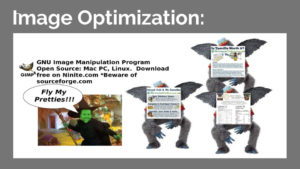

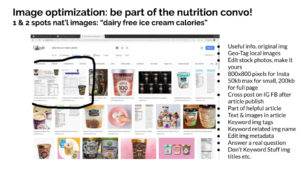
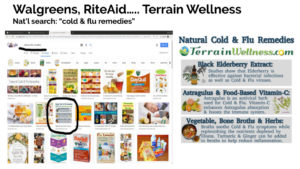
- Do’s & Don’t of Image Optimization
- Convey useful info, convey an idea or emotion
- Beware of copy/pasting Google Image Search stock photos
- Consider the GNU Image Manipulation Program, it’s like a free PhotoShop
- Check out 123rf.com for affordable stock photos
- Edit, crop, caption & compress your stock photos
- Write useful image tags with keywords
- Keyword related image names
- Use Geo-Tagging for local images
- Edit stock photos, make it yours
- 800×800 pixels for Instagram
- 50kb max for small, 200kb for full page
- Cross post on IG FB after article publish
- Make optimizaed images part of helpful article
- Infographics that answer a question are doing well
- Don’t Keyword Stuff image titles etc.
- Don’t use keywords in every image
Image optimization is an important, but often overlooked part of SEO for functional medicine, naturopathic and acupuncture clinics. Why spend hours crafting high-quality articles only to just scrape some used images off of google or someone else’s site? FYI, Google is very good at figuring out what images mean or convey. Furthermore, Google’s algorithm can quickly determine whether an image is a stock photo or taken from someone else’s website. The result is that copy & pasted images are useless for SEO.
Properly optimized images that illustrate or summarize your articles are a great way to make your content stand out and move up in search engines. Not only that, useful and educational infographics also get a lot of good links and shares on social media because a good inforgraphic provides a lot of useful information at a glance.
Questions & Answers
- Q: I wrote a book, how can I use SEO to publish/promote?
- A: 1st books are often self published. Since writing is strong for you, you can make articles related to the book’s topics to build an audience and sell the book right on the website. Many authors will release excerpts of their book as website articles to build interest so people will need to buy/download the book to read the rest. Use the techniques I gave in lecture and on this digital marketing/SEO-Guide to get web traffic from keywords related to the book’s topic. Then, when your site gets popular, use one of millions of wordpress apps called “plugins” to offer people that like the articles a chance to buy the e-book etc right from your website. If your website is small, get guest author spots on other websites to promote your ideas. There are many eCommerce apps called “plugins” for wordpress for selling on your site. Here’s a few: eBookStore, WP Ecommerce and of course there’s WooCommerce for setting up online stores.
- Q: How do I SEO for women’s health, reproductive health or sexuality while avoiding the wrong attention?
- A: Google is more picky about this type of content because they want to protect people from bad actors releasing malicious content. You do need to careful, but this work is much-needed and the world needs your voice: so maybe try this plan while testing/refining as you go. The overarching goal for my strategy would be to FIRMLY PLANT YOURSELF AS A WOMEN’S ALLY and advocate, not a bad actor. Note that in this answer I have linked to numerous websites that offer women’s resources and advocacy as an example.
First, audit websites that are on Google searches surrounding your area of practice and use them as inspiration. Then, I would also start with writing content that provides women with resources. Maybe write about women’s shelters, how to escape domestic abuse with links to reputable psychology and women’s support networks. Also link to women in business groups, advocacy groups for women etc. Consider writing in-depth articles on positive female role models or feminist leaders that you look up to and link to their bio page. Maybe some articles about helping women in the developing world with reproductive rights and health and link to reputable charities like Doctors without borders or similar. You want to show very strong support for women and the issues they face. Then, mix in content about women’s health issues while linking to medical journals. On your content, low-key mention who you are so that if people want your services, they can find you. In short, you want to build an unshakeable foundation of being a women’s advocate/ally and not a harmful bad actor.
- Q: I’m an introvert & don’t want to be on video, what can I do?
- A: Believe it or not, I am an introvert myself: which is why I write articles/blogs rather than going out and getting new customers in real life. The only reason why I crawl out of my shell to teach this course is because I’m passionate about the message. As far as video, you don’t need to personally appear in the video for it to help your website. Maybe you have a patient/friend give you a video recommendation or testimonial and put that on your website? Maybe you record a supervisor, professor or colleague briefly telling potential employers why they should hire you? Or, you can make a video slideshow without any person in it that briefly tells patients or future employers what you bring to the table. There are also successful videos where the person on camera doesn’t say anything and just shows a series of hand-written messages on pages. Please use one of the alternatives above. Maybe video is not your primary medium but you do need to at least have your toe in the water. Video content is highly relevant.
- Q: How long until I get on the 1st page?
- A: “Your mileage may vary” depending on how much competition there is for your specific terms. Dr. Dani had set up a small website while she was in school and had basic pages and a few blogs up so things were simmering for a few yrs before we got serious. Dr. Dani’s basic website was 5-10 pages and had been online for a few years, it had zero SEO and also had a bunch of copied-pasted content on it. Don’t do copied/duplicate content! Once we started doing proper on-page SEO and guest-authoring on some other sites, we started to get on the first page of some terms here and there in 3-6 months. If you want to move ahead faster, guest author or provide image content to a bigger site in exchange for a link to your article. in 6 months, check your Google Search Console and you should see some of your stuff ranking, maybe not 1st page, but progress. Then, build on your success. Start with non-commercial terms that help people. After you get those, link those helpful articles to your commercial pages in a low-key way.
- Q: How do I find subjects to write about?
- A: When you search google, it will give you search suggests at the bottom of the page and it will also try to autofill and give you suggestions -> this means that LOTS of people are asking these related questions and you should consider writing about it. Also, trends.google.com can work too. I also just pay attention to what’s happening and also the season. Think Cold & Flu Season, Holidays, Hew Year’s Resolutions etc too. You’ll have articles that become relevant seasonally. EXAMPLE: when we had the huge forest fires in the Gorge I wrote articles about how to support lung health in the smokey air.
- Q: Will citing scientific and/or technical journals boost SEO even if I’m not the best writer?
- A: Yes, absolutely! Plus, writing content is the only way to get better. Start writing now and then in a few years once you have more experience edit/improve your old content to make it sound more professional later, or even hire an editor. Citing credible sources will help make up for okay/marginal writing experience/skill. If you’re uncomfortable with formal writing, try just writing conversationally.
- Q: What if a spammer/blackhat/bad-actor links to me from a bad website???
- A: This process is a huge part of SEO called Reputation Management. Google search: “Google link disavow” and you can follow google’s instruction for having spammy/malicious links deleted. Here’s an article on disavowing bad links in more detail: DISAVOW BAD LINKS
- Q: Can I have WordPress on my own website? Can I edit the code?
- A: Yes, think of WordPress like free software that you can upload on any website you own. This confusion arose because there are free MyName.worpress.com subdomains available. But, you can run the WordPress software anywhere you want: you should definitely run it on your own web domain & hosting account. So, the WordPress software is free, all you do is buy a domain name and server space to park it on. WordPress is open-source, so you are allowed to edit/change/modify/hack the code as much as you want. You can use this to full advantage even if you don’t know computer languages like PhP or JavaScript by carefully copying and pasting certain code snippets to add new functions to your site. There are also millions of free (and cheap) apps called “plugins” that you can use on your site. WordPress is ultimately customizable.
- Q: Blogging/Articles are not part of my marketing plan, does SEO still matter?
- A: Even if you are not writing “articles or blogs” you still need to use all of these keyword strategies on your website’s services pages or your personal brand pages if you want to work for someone else. Even if you never own a business, you still need to understand basic SEO for your personal brand, your own name and basic services/industries that you participate in.
